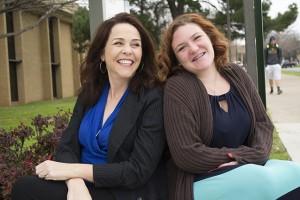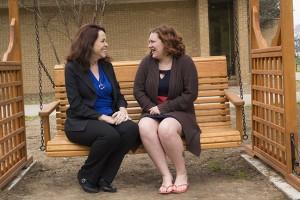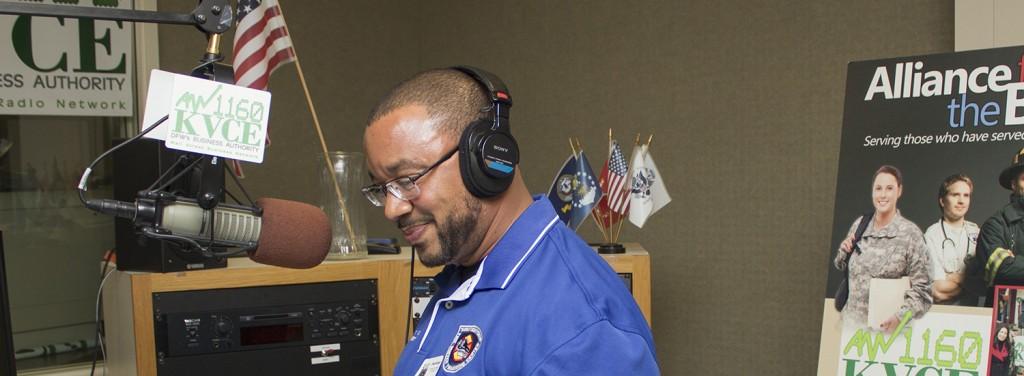By Tabitha Redder/managing editor
A common rite of passage for youth is finding a niche, whether it’s with peers, co-workers or society. For some, it is a staggering obstacle to overcome.
But the thousands who are too old for foster care and too young for complete independence are just as lost in their young adulthood as they were in their youth.
Some of these fosters who have aged out of the system now attend TCC. Destany Deleon, at 17, is young for a second-year NE student, yet years as a foster child

Photo by: Katelyn Townsend/The Collegian
have left her feeling older than most teenagers.
“It definitely is a constant struggle,” Deleon said. “It’s not fun to be 17 years old and live a completely grown-up life. I haven’t had the experiences that most people have. I try my best to move forward, and I try to not let the past hold me down.”
NE speech instructor Amber Meyers has been fostering children since 2003, including Deleon.
“They’re just worried,” Meyers said. “They’re so worried about being rejected again. They just think, ‘Where do I fit in the world?’”
The U.S. Department of Health and Human Services reported over 30,000 Texas children in foster care as of September 2012.
Over half of foster children relocate schools seven times during their primary and secondary education, according to a Casey Family Programs study.
For Meyers, her former position as vice principal of a middle school began her journey as a foster parent.
“I met a young lady who was recently into foster care, and when you’re new into foster care and you’re 13 and a girl, you’re just mad all the time,” she said, laughing. “She came to my office a lot and seemed like a really nice kid. I was like, ‘We could be foster parents!’ My husband and I had only been married a year, and we just thought, ‘Let’s do it!’”
Through complete chance, after the Meyers became certified to foster and were fostering a few children of their own, the 13-year-old girl who frequented her middle school principal’s office was placed into Meyers’ home and the Meyers adopted her.
University of North Texas student Mariah Barton was housed into foster care in fifth grade to escape an abusive situation. She met Meyers when she entered middle school a year later.
“I spent a lot of time in her office,” Barton said. “She understood I wasn’t a horrible person.”
Barton was shuffled around five different foster homes before the age of 18, and fate brought her back to Meyers.
“I had one foster home with two amazing parents who taught me right from wrong and got me into dancing and music, but then they retired. Then, I went into a situation where I was supposed to be adopted, but that fell through because the woman was crazy and said she was going to kill me,” Barton said, laughing. “I was removed from that home immediately. Then they asked [Meyers] to take me and she said, ‘No, my house is full,’ then they begged her, and she said ‘OK, fine, what’s the girl’s name?’ They tell her my name, and she’s like ‘Oh! That’s my Mariah!’”
Barton graduated high school at 17, was married by 18, pregnant and had her daughter by 19 and divorced her husband by 21. She’s currently on track to get her bachelor’s degree studying hospitality, business management and psychology.
The union between Meyers and Deleon was even more fateful.
“I first met Amber when I was 7 years old,” Deleon said. “My parents were addicted to methamphetamine and couldn’t get clean, so I was sent to foster care, and that’s when I met Amber’s mother. She was my foster mom, and we just kind of clicked.”
Deleon said she lost contact briefly with Meyers and her mother because her parents began passing drug tests and regained custody when she was 11 years old.
When she was 16, Deleon was returned to foster care and, ultimately, Meyers’ custody to escape a bad relationship.
High school graduation rates are low for foster children, and the varying grading systems, curricula and academic terms only add to the chaos. This, in turn, results in low college attendance rates.
If foster children are moved frequently, their education suffers, Meyers said. When children are studying math at a school in Keller, then move to Fort Worth and find they teach a completely different way or are on a different unit, then are relocated back to Keller, they’ve missed material and become discouraged.
“Once they fall behind, especially in courses that build on things from year to year, without intense remediation, they don’t catch up,” she said. “Math skills are very low. Reading scores are very low. All of these things are very low, and students go to college, take the TSI and fail all the sections and say, ‘See, I knew I

Photo by:Katelyn Townsend/The Collegian
wasn’t college material.’”
Deleon’s 19-year-old brother and former TCC student Joseph Meyers is another foster child Amber adopted.
“For any child that has just been taken away from their family or their regular life, simply adjusting to a completely new pattern will make it incredibly difficult to focus on anything,” he said. “When it’s rigorous academic studies, that’s just another hurdle to pass through.”
Though the Texas Department of Family and Protective Services grants a free college tuition waiver for public institutions in Texas to children who meet a lengthy qualification list and aged out of the foster care system, few students take advantage of the opportunity.
“I was in care for three years, and evidently that’s not enough, so I don’t get free tuition. I have to pay for myself,” he said. “It’s tough. It’s definitely not fair. My foster brother got free tuition because he was in foster care for like two weeks longer than me.”
Joseph enrolled at TCC at 16 and dropped out of school but plans to enroll in a university soon. Even though he will receive free tuition when he returns, he knows it won’t be cheap.
“Tuition is only one of the costs associated with college. You also have to worry about housing, meals, and textbooks are often more expensive than the classes themselves,” he said. “It often comes out simply, even with free tuition, just too much to balance.”
A 2011 University of Chicago Chapin Hall Center for Children evaluation of former foster youth reports grim statistics. By age 19, only 66 percent of women and 58 percent of men had graduated from high school or received a GED, and by age 23 or 24, only 37 percent of females and 26 percent of males had completed at least one year of college.
Those familiar with the foster system believe the low education rates stem from not only lacking resources but from lacking support.
Amber Meyers referred to Maslow’s hierarchy of needs with foster children when explaining the low success rates.
“How can we expect kids to function at the top of the triangle where critical thinking and creative problem-solving happen whenever the very bottom of safety and security are not there because they don’t know what’s going to happen?” she said. “So they start college and then flounder unless you really have a champion by your side, and it’s hard to find a champion.”
She added that many foster children are born into generational poverty and have a different way of thinking as an additional reason.
“When you’ve never been anything but poor, their mindset is different. They’re only concerned with now because when you truly have no control over anything in your life such as, ‘Am I going to get fired?’ ‘Is Dad going to lose his job?’ there’s no reason to plan for the future,” she said. “Trying to convince somebody like that that it’s worth it to spend four or five or even six years in working in college, they’ll just say ‘Screw it!’ and go to work.”
The foster children who age out of the system with the drive to succeed and the support to fuel them to reach their goals, do succeed.
Deleon plans to major in psychology and hopes to be a social worker or counselor.
“I want to help people go through what I went through and to get past it,” she said. “I want to know why my brain functions the way it does and why I feel the way I feel. I just want to know everything!”
Barton, who is currently the assistant manager of a hotel and has a 7-year-old daughter, said she was grateful for Amber Meyers’ encouragement.
“I know I hate school and am a bad student,” she said, laughing. “In the beginning, [Meyers] said, ‘You have to go to school. You have to.’ I know I’m lucky and had a positive experience. If I didn’t have my family’s support during my divorce or when I went to school and when I wasn’t in school, I wouldn’t be the person I am right now.”

























